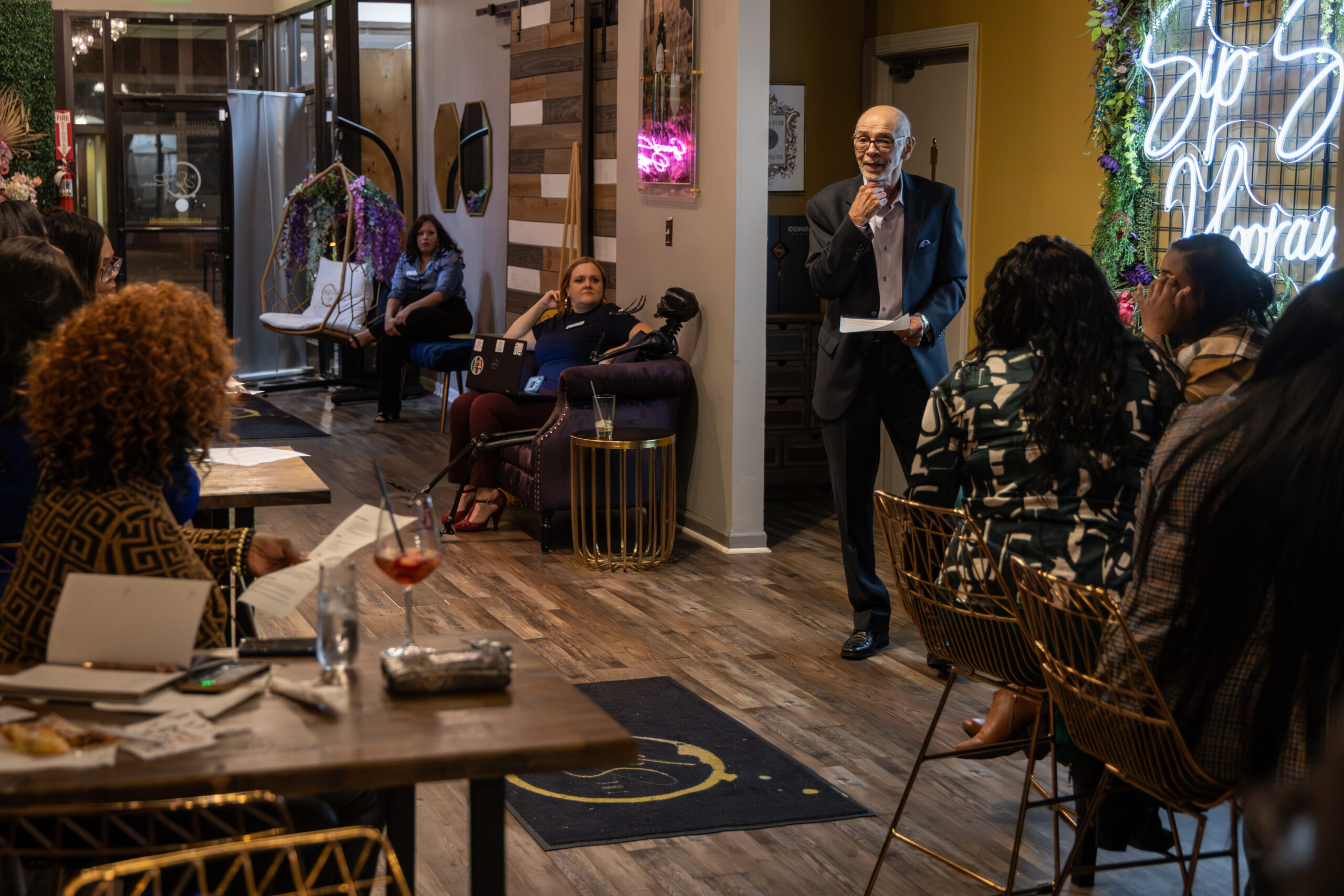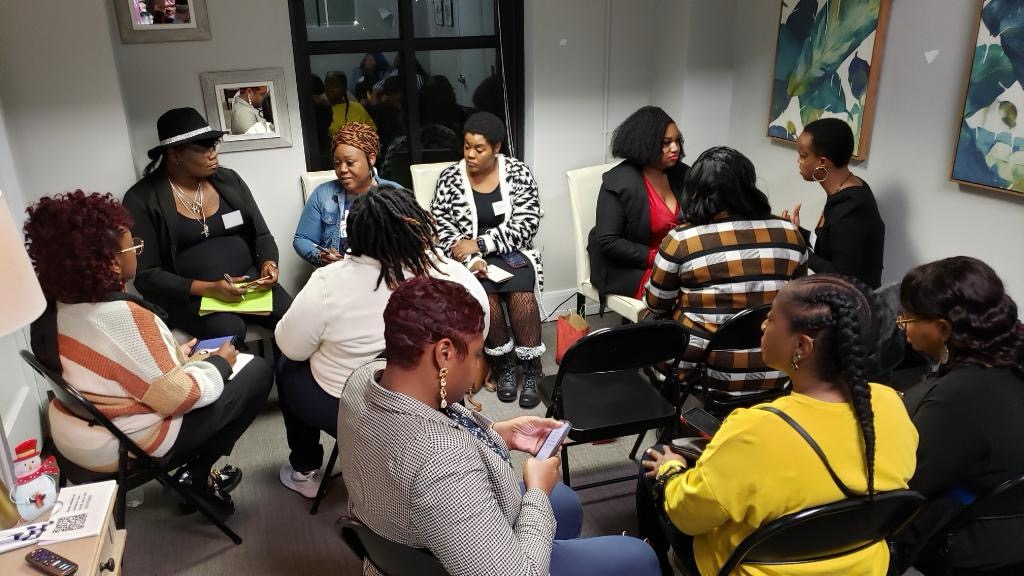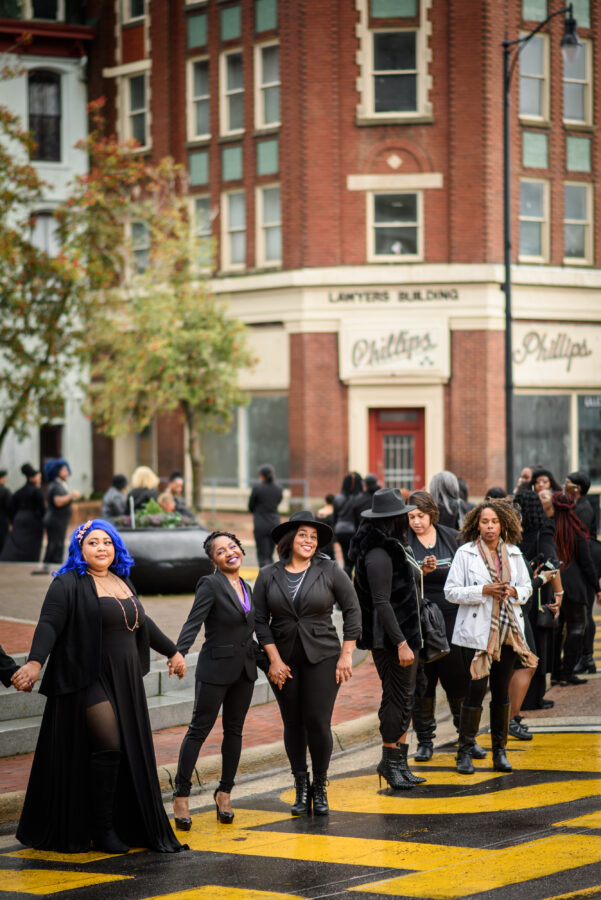How The Fayetteville Observer’s engagement work is giving Black professional women a chance to shine
Beth Hutson, Myron B. Pitts and Taylor Shook, The Fayetteville Observer,
Retired Judge Greek Weeks moderates the discussion during Your Story Matters: Community Conversations with The Fayetteville Observer in October 2023 at the Sip Room in Fayetteville, N.C. (Paul Woolverton/The Fayetteville Observer)
Here’s an idea to steal and adapt: To build truly meaningful engagement with underserved communities, identify and target specific audiences within those groups — as The Fayetteville Observer did with Black professional women.This is a series on Better News to a) showcase innovative/experimental ideas that emerge from the Knight-Lenfest Newsroom Initiative and b) share replicable tactics that benefit the news industry as a whole.
This “win” comes from Beth Hutson, news director; Myron B. Pitts, opinion editor; and Taylor Shook, food, dining and culture reporter; all of the Fayetteville Observer, which participated in the UNC-Knight Foundation Tables Stakes program in 2021-22 and the American Press Institute’s Mobilizing News sprint cohort for Table Stakes alumni in 2023.
Question: What problem were you trying to solve, and why was that problem strategically important to your organization?
Answer: We made a commitment to better serve Black readers and begin to earn their trust to address our 200-year-old newspaper’s history of neglect and sometimes outright harm to members of that community.
We recognized, however, that Black people aren’t a monolith, and we needed to drill down and really get to know the specific groups within the Black community. Last year, we decided to turn our focus to Black professional women ages 30-45 because they are some of the biggest movers and shakers in our community.
While many are in leadership positions and do a lot of the hard work to make our community better, they’re often left out of the conversation. Their stories frequently go untold.
In serving this group, many of whom have families and children, as well as extensive professional and community connections, we would create ambassadors for our brand. It just makes sense.
We were successful in creating partnerships during our first Table Stakes challenge and we wanted to improve our engagement strategy. This group was the perfect fit for that work.
Q: How did you go about solving the problem?
A: The three of us worked all summer to build a list of new and existing contacts in our target audience. We made new connections at community events, where we shared with people our mission to make sure our coverage reflects all the communities we cover.
Then, we invited about a dozen women from our contact list to our first “Your Story Matters” listening session in October. We asked each invitee to bring a Black woman professional as a guest.
It was important to us to use our event budget of roughly $2,000 to invest in this group, and we’re proud to share that we worked with Black women-owned businesses for the event venue, catering, drinks and gift bags. We wanted these women to feel special, so we hosted our event at the Sip Room, a Black woman-owned wine bar in downtown Fayetteville.
Gregory Weeks, a well-respected retired judge with experience in diversity and inclusion efforts, helped us craft an agenda of discussion topics like media, family, healthcare and education. Weeks, who is also African American, served as moderator at the event.
Our whole staff attended the listening session, including a reporter who took portraits of the guests for their use. Turnout was a little lower than expected at 17 participants, but we got positive feedback from guests through the event survey, in person and via messages after the event.
We offered each attendee a free digital subscription through the end of the year and invited them to a private Facebook group, where we shared the stories that the listening session discussion prompted and other pertinent coverage and asked for feedback. Staff and group members continue to keep the conversation going and invite new members in the target audience to the group.
We held our second listening session in December at the office of one of our original participants. She was so excited about the first listening session and our Facebook group that she volunteered her office space.
This listening session was nearly identical to the first event, but we incorporated feedback to allow guests to choose their own discussion topics. Again, we worked with Black women-owned businesses for the venue, catering and a private cocktail bar, and Judge Gregory Weeks moderated the discussion.

Participants in the second Your Story Matters: Community Conversations with The Fayetteville Observer discuss topics in groups in December 2023 at Personameant Solutions in Fayetteville, N.C. (Beth Hutson/The Fayetteville Observer)
Q: What worked?
A: For both sessions of “Your Story Matters,” we asked each woman to bring along a friend, and that turned out perfectly for us. They were all for it. It was an effortless way to grow the group manageably and make more connections within our key audience. Most of the friends were in the same age demographic.
We chose Black woman-owned venues and hired Black women vendors for the catering and services, including a mobile bar. This also extended our reach, as some of the vendors joined the group.
In one case, a woman who is a female youth pastor brought her mother, the senior pastor at the same church. The mom was a key contributor in an emotional discussion about mentoring and relationships among Black women entrepreneurs. She was a mentor in the process; it was nice to see.
Later, we did a story about the church and its community activities, which included operating a food pantry and tutoring school kids.
Other stories that came directly from this group included a two-part series on youth mentorship, as well as a story looking at the funding barriers that Black women-led nonprofits face.
Q: What didn’t work?
A: Most of what we tried was successful, but we did experience a few glitches.
- The most important lesson we learned was to keep the agenda simple. In our first session, we introduced five main topics, with multiple questions related to each. Our participants had quite a lot to say about the issues and told us they did not feel there was enough time to properly discuss each of them. We cut the topics down to three for the following event and were able to have much more in-depth discussion. We plan to limit the discussion to one topic at our next session.
- If you want people to complete a survey at an event, you must set aside time for that. During our first session, we gave out QR codes and asked people to complete a survey about the event when they had a chance. We received very few responses. At our next session, we built in time for the survey and saw our completion rate go up 100%.
- We did not build in time for breaks during our first session, and several participants told us they would have appreciated that. For our next session, we scheduled a 15-minute break at about the halfway point.
Q: What happened that you didn’t expect?

Black women encircle the Market House during the 100 Professional Black Women in Black photo shoot in January 2024, in downtown Fayetteville, N.C. (Andrew Craft/The Fayetteville Observer)
A: The most incredible result of our work had very little to do with us and everything to do with one woman, Tiffany Campbell, who participated in both of our listening sessions. One of the most emotional exchanges in the first session centered on a discussion of how Black women could support each other. A discussion question in the December session also concerned the need for a networking group for Black professional women.
Campbell, a youth counselor and community activist, was among the attendees who said they hoped Black professional women could continue the work of “Your Story Matters” and start such a group.
Campbell subsequently organized 100 Professional Black Women in Black, which was held Jan. 6 and was a smash success. Fayetteville Observer journalists covered the event, where more than 150 women and girls dressed in black and took part in a photo shoot at two locations, including the historic Market House, where enslaved people had been sold. The women circled the building, held hands and sang uplifting songs.
Campbell directly credits conversations in our listening sessions for inspiring her event. She has received such a great response that she organized a separate Facebook group for the women and held a similar event for Black men in early February.
Beyond news coverage, we have played a background role because this has taken on a life of its own beyond the Observer, and that is great to see. Campbell gave us the heads-up before she started her Facebook group, which we thought was encouraging — if not necessary — because it showed she believes, as we do, that we have a relationship.
Q: What advice would you give to others who try to do this?
A: Let the group take the lead. We ask attendees to suggest discussion topics and listening session meeting times. Also:
- Offer free digital subscriptions: It only makes sense, given that we often ask the group to read our stories and provide feedback. It’s also a nice way to thank them for their time and effort.
- Be consistent: We continue to keep lines of communication open between events.
- Focus on listening: We learn a lot more when we keep our remarks to a minimum. Active listening helps our participants feel heard.
- Be transparent with your group and your readership as a whole: We made sure the women in this group understood the purpose of our engagement with them. Beth also wrote a column explaining what we did and why. Reader feedback from that column was generally positive, and it even led to a story.
- Be patient: Engaging with an underserved audience is about building trust and relationships. It’s important to recognize that it can take time before you see the fruits of your labors in page views and subscriptions. You are laying the groundwork for your organization’s future.
Q: What’s next for this work?
A: Among the feedback we received on this work:
“I felt heard.”
“Such care and thoughtfulness was put into this — it felt welcoming and sincere.”
“Do not give up on ‘Your Story Matters.’ It’s going to be bigger than you ever know. So, keep being consistent, keep posting in the group and pushing the initiative, because I got your back.”
“Thank you for seeing us Black women.”
Powerful statements like these serve as a huge motivator for us to continue giving these women a platform to share their thoughts and ideas. We hope our continued focus on this group will demonstrate our commitment to them and foster trust. To that end, we plan to:
- Continue our listening sessions on a bimonthly basis, always learning from participants and implementing those lessons in future sessions.
- Continue engaging with these women in our Facebook group and seeking their feedback on stories, as well as their story suggestions.
- Continue to support Tiffany Campbell’s efforts with her 100 Professional Black Women group.
Later this year, we will begin working with a new audience we want to reach in the Black community. We are better prepared this time because we now have a roadmap for truly meaningful engagement.